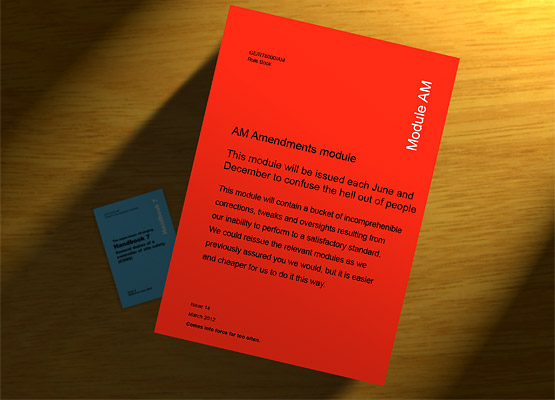|
David Renwick is a fabulous comedy writer. His career has so far brought two celebrated successes - Jonathan Creek, for which he dreamt up 27 different ways to escape a locked room, and One Foot in the Grave. In each episode of the latter, a collection of apparently independent, sometimes ridiculous and often insignificant events were played out, but he then wove them together into an exquisite climax that made sense of it all. That level of skill is a joy to behold.
All forms of communication take us on journeys - sometimes straightforward, sometimes convoluted. But the key is clarity: if every step makes sense and follows a well-flagged path, there should be no problem finding the intended destination. Recognising this truth has an obvious imperative when safety is critical. And it’s not just about the words themselves. Other factors - tone, structure, presentation - also play a part.
You wonder then why the supposed professionals at RSSB are still unable to deliver a Rule Book that meets these basic needs, despite years of trying and average salaries of £59k. The organisation itself has a cash reserve of £7.5million - you’d think some of that could be invested in driving up quality. But instead of the rules being “clear, concise and precise” (they are no longer aiming for “simple”), tinkering brings biannual befuddlement to frontline users. The upshot is uncertainty - destabilising rules knowledge - which, in turn, gives rise to error. If this perpetual state of flux had been forced upon the Board by operational requirements, then so be it. But instead it is a function of institutional hopelessness - RSSB is seemingly devoid of the skills to get things right first time and the strong, focussed management that would tackle this failing.
Take the June 2012 changes. Five modules are being reissued, two are withdrawn, and a new one comes into force dealing with the management of incidents, floods and snow. Repairs are required to four trackworker Handbooks - products of the much heralded New Approach - just 18 months after they first emerged from a lengthy consultation and approval process. Some of the blunders were inexcusable, bringing with them practical difficulties. But that’s only half the story. Beyond this is an avalanche of tweaks affecting 23 other modules. These are spewed into the industry via a bumper Amendments module (AM) of 205 substantive pages. Yes, that’s 205. Absolutely bonkers!

The voluminous Amendments module completely overshadows RSSB's super-duper, all-singing, Emperor's-new-clothes, rules handbooks.
The purpose of the Amendments module is threefold -
- to demonstrate that you can’t believe a word RSSB says
- to prove that those in the industry’s loftier parts don’t care whether those lower down understand the rules (until there is an incident) as long as they can put a tick in the ‘Has this change been communicated?’ box
- to give lie to the notion that safety comes first.
When the last Rule Book debacle came to fruition in 2003, the industry was promised fewer changes and any that were made would involve replacing the affected module: clear and simple. But that commitment has been quietly abandoned. Module AM is now the vehicle of choice for changes that “do not justify reissue for the module concerned”. Justify on what grounds? If a safety critical instruction is altered, common sense (and probably the law) dictates that it must be communicated to those involved in the most coherent and effective way possible. But that would cost money. Instead, better to bury vital information in a rubbish dump; end users can then proactively scavenge for it. And everyone does of course…diligently. Not.
|
| ...better to bury vital information in a rubbish dump; end users can then proactively scavenge for it. |
|
The extent of this nonsense is laid bare through Module TW3. Issue 2, currently in force, was unveiled in November 2004 and anyone seeking guidance on the Preparation and movement of locomotive-hauled trains would no doubt reach for it. What they would probably fail to do - especially when urgent enlightenment is sought - is also cross-reference its contents against Module AM issues 2, 3, 4, 5, 6, 7, 8, 9, 10, 11, 12, 13 and 14, all of which feature relevant changes. Issue 3 of Module S5 details four situations when a driver can pass a signal at danger under his own authority, and yet two of these were removed in Issue 13 of the Amendments module on the grounds that they were only “very rarely used”. Note the difference between “very rarely” and “never”.
Practically every live Rule Book module has built-in anomalies thanks to the approach of its custodian. That’s the challenging reality for those in operational roles whose compliance with the rules is mandatory and whose lapses impact on their employment prospects. It apparently doesn’t matter that a driver, unable to contact the signaller, might authorise himself to pass an auto signal at danger because the rule that now prohibits it was lost of the fog. Such trifles are of no consequence to the distant desk jockeys, unburdened by accountability. They’ve done their bit and the committee has approved it.
The scale of this mess is no secret. Rule confusion underpins incident after incident, as inquiry findings confirm. But the industry demonstrates a continued unwillingness to start the clean up. For managerial convenience, it has contrived a process that guarantees failure - with all the attendant implications. And the safety regulator stands back and watches it happen. This isn’t a carefully crafted sitcom; it’s a Carry On farce. You might laugh, but only through embarrassment.
|